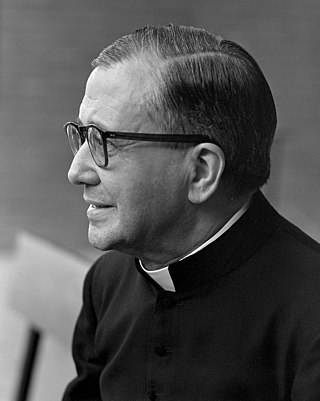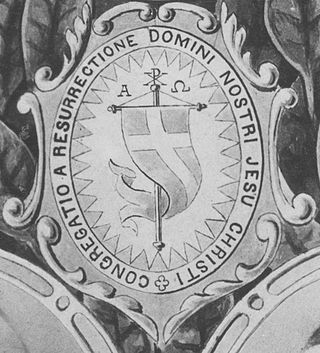Related Research Articles

Opus Dei is an institution of the Catholic Church that was founded in Spain in 1928 by Catholic priest Josemaría Escrivá. Its stated mission is to help its lay and clerical members to seek Christian perfection in their everyday occupations and within their societies. Opus Dei has long attracted significant controversy regarding its political activities and its alleged cult-like practices.

Saint Josemaría Escrivá de Balaguer y Albás was a Spanish Roman Catholic priest. He founded Opus Dei, an organization of laypeople and priests dedicated to the teaching that everyone is called to holiness by God and to discover sanctity in their ordinary lives. He was canonized in 2002 by Pope John Paul II, who declared Josemaría should be "counted among the great witnesses of Christianity."

The Confederation of Oratories of Saint Philip Neri, abbreviated C.O. and commonly known as the Oratorians, is a Catholic society of apostolic life of pontifical right for men who live together in a community bound together by no formal vows but only with the bond of charity.
The Society of the Atonement, also known as the Friars and Sisters of the Atonement or Graymoor Friars and Sisters, is a Franciscan religious congregation in the Catholic Church. The friars and sisters were founded in 1898 by Paul Wattson and Lurana White as a religious community in the Episcopal Church. The religious order is dedicated to the Blessed Virgin Mary under the Marian title of Our Lady of Atonement.
The Passionists, officially named the Congregation of the Passion of Jesus Christ, abbreviated CP, are a Catholic clerical religious congregation of pontifical right for men, founded by Paul of the Cross in 1720, with a special emphasis on and devotion to the Passion of Jesus Christ. A known symbol of the congregation is the labeled emblem of the Sacred Heart of Jesus, surmounted by a cross. This symbol is often sewn into the attire of its congregants.
In Christianity, an oblate is a person who is specifically dedicated to God and to God's service.
Opus Dei and politics is a discussion on Opus Dei's view on politics, its role in politics and its members involvement in politics.
Opus Dei in society refers to the social mission, general social strategy, social activities, work, relationship with politics and other aspects of Opus Dei.

The Neocatechumenal Way, also known as the Neocatechumenate, or NCW is an itinerary/process in the Catholic Church for faith formation. It is inspired by the catechumenate of the early Catholic Church where converts from paganism are able to be prepared for baptism through a process of faith formation. This post-baptismal formation helps deepen the faith for adults that have already been baptized, and provides basic instruction to those that are far from the Church. This itinerary of formation adapts the rites of the Rite of Christian Initiation of Adults (RCIA) for those that have already been baptized, without repeating the sacrament of baptism.
Opus Dei is a personal prelature within the Roman Church that has been the subject of numerous controversies. Throughout its history, Opus Dei has been criticized by many, including by numerary members who knew the founder and had roles in Opus Dei's internal government. The reports by former members in the US, England, Spain, Latin America, France, Germany, and other countries are published. Journalists have described it as "the most controversial force in the Catholic Church" and its founder Josemaría Escrivá as a "polarizing" figure.
Canonization of Josemaría Escrivá de Balaguer discusses John Paul II's decision to canonize Josemaría Escrivá, founder of the Prelature of the Holy Cross and Opus Dei, more commonly known as Opus Dei.

The Order of the Immaculate Conception, abbreviated OIC and also known as the Conceptionists, is a Catholic religious order of Pontifical Right for nuns founded by Saint Beatrice of Silva. For some years, they followed the Poor Clares Rule, but in 1511 they were recognized as a separate religious order, taking a new rule and the name of Order of the Immaculate Conception.

The Resurrectionists officially named the Congregation of the Resurrection of Our Lord Jesus Christ, abbreviated CR is a Catholic clerical religious congregation of Pontifical Right for men. It was founded in 1836 by three men, Bogdan Jański, Peter Semenenko and Hieronim Kajsiewicz on the heels of the Polish Great Emigration.

Isabella I, also called Isabella the Catholic, was Queen of Castile and León from 1474 until her death in 1504. She was also Queen of Aragon from 1479 until her death as the wife of King Ferdinand II. Reigning together over a dynastically unified Spain, Isabella and Ferdinand are known as the Catholic Monarchs.
A religious brother is a member of a religious institute or religious order who commits himself to following Christ in consecrated life of the Church, usually by the vows of poverty, chastity and obedience. He is usually a layman and usually lives in a religious community and works in a ministry appropriate to his capabilities.
Women form 57% of the membership of the Opus Dei prelature. The role of women in Opus Dei has sometimes been a source of criticism for the organization.
The martyrs of Turon is the name given by the Catholic church to a group of eight members of the Catholic, religious-teaching congregation Institute of the Brothers of the Christian Schools, also known as De La Salle Brothers, and one Passionist priest who were executed by insurrectionists in Spain, during the Asturias uprising of October 1934. They were canonized in 1999 by Pope John Paul II.

Dora del Hoyo Alonso, was one of the first women members of Opus Dei. A domestic worker by profession, del Hoyo was the first to join the Prelature of Opus Dei as an assistant numerary meaning that she dedicated herself professionally to caring for people and looking after the material needs of Opus Dei centers. From 1946 until her death, she lived in Rome, Italy where she collaborated first with Josemaría Escrivá de Balaguer, Opus Dei's founder, and later on with his successors Álvaro del Portillo and Bishop Javier Echevarría, in the domestic management of the first Opus Dei center there, later the movement's headquarters. Her process of canonization was opened in Rome on June 18, 2012 by Echevarría, at the request of many who knew and worked with her. Her mortal remains lie close to the tomb of Escriva, in the crypt of Our Lady of Peace Church in Rome.
References
- ↑ Miles Jesu: About Us Archived 2012-02-22 at the Wayback Machine
- 1 2 History of Miles Jesu Archived 2012-02-22 at the Wayback Machine
- ↑ "Christian Order - Read - Features - May 2004". www.christianorder.com. Retrieved 2020-06-25.
- 1 2 3 Statement on the Situation of the Ecclesial Family "Miles Jesu" Archived 2012-03-06 at the Wayback Machine
- ↑ Domus Membership Archived 2012-03-06 at the Wayback Machine
- ↑ Vinculum Membership Archived 2012-02-22 at the Wayback Machine
- ↑ "Card. López Trujillo presidirá Eucaristía de conversos en Santiago de Compostela". www.aciprensa.com. Retrieved 2020-06-25.
- ↑ Monastic orders and communities of the UGCC Archived 2011-07-27 at the Wayback Machine
- ↑ Cause for Canonization of Paul Murphy
- ↑ "Cause for Canonization of Servant of God Queen Isabel the Catholic". www.queenisabel.org. Retrieved 2020-06-25.
- ↑ "Cause for Canonization of Servant of God Queen Isabel the Catholic". www.queenisabel.org. Retrieved 2020-06-25.